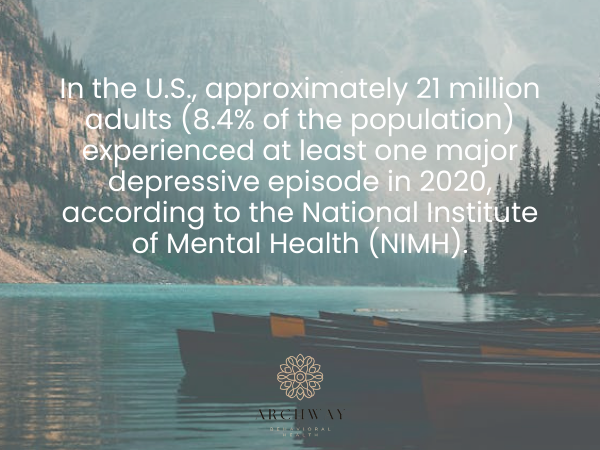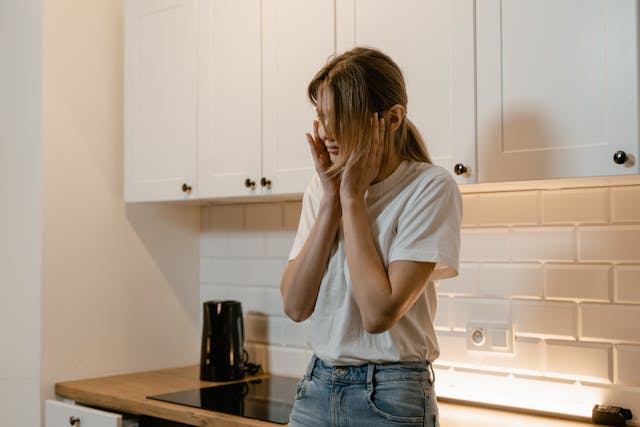Depression is a mental health condition that profoundly affects emotional well-being, but its impact doesn’t stop there. It also manifests in significant physical symptoms, which can be as debilitating as the emotional challenges. These physical effects often go unnoticed or misattributed to other health issues, leaving depression untreated and its impact on the body unaddressed.
This article delves into the physical effects of depression and explores comprehensive treatment options, including Individual Therapy, Group Therapy, Partial Hospitalization Programs (PHP), and Intensive Outpatient Programs (IOP). Additionally, we highlight evidence-based therapies like Cognitive Behavioral Therapy (CBT) and Dialectical Behavior Therapy (DBT), all offered at a Mental Health Treatment Center to provide holistic care for this complex condition.
Understanding the Physical Impact of Depression
While the emotional and psychological symptoms of depression are well-known, the physical effects often go unrecognized. Depression can significantly impact the body’s systems, contributing to a range of health issues that exacerbate emotional symptoms and hinder daily functioning.
1. Chronic Fatigue and Energy Depletion
One of the hallmark physical symptoms of depression is persistent fatigue. This is not ordinary tiredness but a deep, unshakable exhaustion that makes even simple daily tasks feel insurmountable. This fatigue is often linked to disruptions in the body’s energy regulation systems, including hormonal imbalances and altered sleep cycles.
2. Sleep Disturbances
Sleep problems are pervasive among those with depression. Some individuals experience insomnia, finding it hard to fall or stay asleep, while others face hypersomnia, sleeping excessively but still feeling unrefreshed. These disturbances disrupt the body’s natural restoration process, leading to further physical and mental exhaustion.
3. Pain and Discomfort
Depression often manifests as physical pain, including headaches, backaches, joint pain, and muscle tension. This connection between mental health and pain stems from changes in the nervous system and heightened sensitivity to physical sensations, commonly referred to as “somatization.”
4. Digestive Issues
The gut-brain connection highlights the strong relationship between mental and physical health. Depression can cause gastrointestinal symptoms such as nausea, constipation, diarrhea, or abdominal pain. Changes in appetite—whether a significant increase or decrease—can also contribute to digestive discomfort and unintended weight changes.
5. Weakened Immune System
Chronic depression places stress on the body, weakening the immune system and increasing susceptibility to illnesses. This compromised immunity can lead to frequent colds, infections, and slower recovery times.
6. Cardiovascular Risks
Depression has been linked to an increased risk of heart disease and high blood pressure. The stress associated with depression can lead to unhealthy lifestyle habits, such as poor diet, lack of exercise, or smoking, which further exacerbate cardiovascular risks.
7. Hormonal Imbalances
Depression disrupts the regulation of hormones like cortisol, the body’s primary stress hormone. Prolonged elevation or suppression of cortisol levels can negatively affect mood, energy levels, metabolism, and even reproductive health.
How Physical Symptoms Amplify Emotional Challenges
The interplay between the physical and emotional effects of depression creates a vicious cycle. For instance, chronic fatigue or pain can lead to feelings of helplessness and frustration, deepening depressive symptoms. Similarly, physical symptoms like sleep disturbances or digestive issues can hinder daily functioning, increasing stress and reducing the ability to engage in self-care or social activities.
Recognizing the physical effects of depression is essential to understanding the full scope of the condition and seeking appropriate treatment.
Causes of Depression
Depression is a complex condition influenced by a combination of biological, psychological, and environmental factors. Understanding these causes is key to recognizing and addressing the condition effectively:
- Biological Factors:
- Imbalances in brain chemicals such as serotonin, dopamine, and norepinephrine can contribute to depression.
- Genetic predisposition also plays a role, with individuals having a family history of depression at a higher risk.
- Psychological Factors:
- Low self-esteem, chronic stress, and unresolved trauma can lead to depression.
- Co-occurring mental health conditions like anxiety can exacerbate depressive symptoms.
- Environmental Factors:
- Life events such as job loss, financial hardship, or the death of a loved one can trigger depressive episodes.
- Prolonged exposure to stressful situations, like an unhealthy work environment or abusive relationships, can also contribute.
- Medical Conditions:
- Chronic illnesses such as diabetes, heart disease, or chronic pain are often linked to depression.
- Certain medications or substance abuse can increase the risk of depressive symptoms.
Physical Symptoms of Depression
Depression doesn’t only affect mental health; its impact on the body can be profound. These physical symptoms can often be mistaken for other conditions, delaying proper diagnosis and treatment:
- Fatigue and Low Energy: Persistent tiredness and lack of energy make even small tasks feel overwhelming.
- Sleep Disorders: Insomnia or excessive sleep disrupt the body’s ability to restore itself, worsening symptoms.
- Chronic Pain: Unexplained physical pain, such as headaches, back pain, or muscle aches, is common.
- Appetite Changes: Depression can cause significant weight loss or gain due to increased or reduced appetite.
- Digestive Problems: Stomach pain, nausea, constipation, or diarrhea may arise due to the gut-brain connection.
- Weakened Immune Function: A prolonged state of stress suppresses the immune system, leading to frequent illnesses.
- Cardiovascular Risks: Increased stress and inactivity can lead to higher blood pressure and heart disease.
Comprehensive Treatment Options for Depression
Addressing depression requires a multifaceted approach that targets both the mental and physical symptoms. Treatment plans often include a combination of therapy, medication, and structured programs tailored to individual needs.
1. Individual Therapy
Individual Therapy provides a private and personalized setting where individuals can explore the root causes of their depression and develop strategies to manage symptoms. Working one-on-one with a licensed therapist allows for tailored interventions and a focused approach to recovery.
2. Group Therapy
In Group Therapy, individuals connect with others who are experiencing similar struggles. These sessions, guided by a therapist, provide a supportive environment for sharing experiences, learning from others, and building a sense of community.
3. Partial Hospitalization Program (PHP)
A Partial Hospitalization Program is an intensive, structured form of treatment for those who require more support than outpatient care but do not need overnight hospitalization. PHP combines various therapies, including CBT and DBT, medication management, and holistic care, to address depression comprehensively.
4. Intensive Outpatient Program (IOP)
An Intensive Outpatient Program offers a flexible treatment option for individuals who need professional support but also want to maintain their daily responsibilities. IOP focuses on evidence-based therapies and skill-building to help manage both the mental and physical symptoms of depression.
5. Depression Treatment Program
A specialized Depression Treatment Program addresses the unique challenges of living with depression. These programs use a blend of therapies, medication, and lifestyle modifications to alleviate symptoms and promote long-term recovery.
6. Anxiety Treatment Program
Since depression often co-occurs with anxiety, integrated Anxiety Treatment Programs help individuals manage overlapping symptoms through targeted interventions and therapies.
Evidence-Based Therapies for Depression
Two evidence-based therapies commonly used to treat depression include:
- Cognitive Behavioral Therapy (CBT): This therapy focuses on identifying and changing negative thought patterns that fuel depression. It equips individuals with practical tools to challenge their thoughts and behaviors, promoting healthier coping mechanisms.
- Dialectical Behavior Therapy (DBT): Originally developed for individuals with intense emotional challenges, DBT combines mindfulness, emotion regulation, and distress tolerance techniques to help individuals manage overwhelming feelings and improve interpersonal relationships.
These therapies are highly effective in addressing both the mental and physical aspects of depression, making them central components of comprehensive treatment plans.

The Role of Lifestyle Changes in Recovery
In addition to professional treatment, lifestyle changes can play a vital role in managing the physical effects of depression.
- Exercise: Regular physical activity releases endorphins, improves energy levels, and reduces symptoms of both depression and anxiety.
- Nutrition: A balanced diet rich in omega-3 fatty acids, whole grains, fruits, and vegetables supports brain health and energy levels.
- Sleep Hygiene: Maintaining a consistent sleep schedule and creating a restful bedtime routine can help regulate sleep cycles.
- Stress Management: Techniques like yoga, meditation, and deep breathing exercises can reduce cortisol levels and improve overall well-being.
These holistic approaches work best when integrated with structured therapies and support programs.
Why Seeking Professional Help Is Essential
Depression is more than just sadness or a bad day—it is a serious condition that can have far-reaching effects on physical health. Left untreated, it can lead to complications such as chronic illnesses, substance abuse, or suicidal thoughts. Professional care at a Mental Health Treatment Center provides the resources and support needed to address these challenges effectively.
Find Help at Archway
At Archway, we provide comprehensive mental health care tailored to address the unique challenges of depression. Our evidence-based treatment options focus on managing both the emotional and physical symptoms of the condition:
- Individual Therapy: Work one-on-one with a licensed therapist to explore the root causes of depression and develop personalized coping strategies.
- Group Therapy: Connect with others in a supportive environment to share experiences and learn valuable skills for recovery.
- Partial Hospitalization Program (PHP): Intensive day treatment offering structured therapy and support while allowing individuals to return home in the evening.
- Intensive Outpatient Program (IOP): Flexible treatment designed to fit around work, school, or other responsibilities, focusing on evidence-based therapies.
- Depression Treatment Program: A holistic program addressing both the emotional and physical effects of depression.
- Cognitive Behavioral Therapy (CBT): A proven approach to identifying and reframing negative thought patterns that fuel depression.
- Dialectical Behavior Therapy (DBT): Techniques for managing intense emotions and improving relationships through mindfulness and distress tolerance.
Conclusion
Depression impacts both the mind and body, creating a complex web of symptoms that require comprehensive care. From chronic fatigue and pain to cardiovascular risks and weakened immunity, the physical effects of depression underscore the importance of treating it as a whole-body condition.
Through evidence-based therapies like CBT and DBT, structured programs such as PHP and IOP, and lifestyle modifications, individuals can regain control and work toward recovery. If you or someone you know is struggling with depression, seeking professional help is the first and most important step toward healing. With the right support and strategies, a brighter, healthier future is possible. Take the step toward reclaiming your life and health—contact us at (888) 488-4103.
Frequently Asked Questions
What are the most common causes of depression?
Depression often results from a combination of genetic, biological, psychological, and environmental factors, such as chemical imbalances in the brain, trauma, chronic stress, or significant life changes.
Can depression cause physical symptoms?
Yes, depression often causes physical symptoms, including fatigue, sleep problems, chronic pain, appetite changes, and weakened immune function. These symptoms can significantly impact daily life.
How is depression treated?
Depression is typically treated with a combination of therapy, medication, and lifestyle changes. Evidence-based approaches like Cognitive Behavioral Therapy and Dialectical Behavior Therapy are particularly effective.
What is a Partial Hospitalization Program (PHP)?
A PHP provides structured, intensive treatment during the day for individuals with severe symptoms, allowing them to return home in the evening. It combines therapy, medication management, and support groups.
What is an Intensive Outpatient Program (IOP)?
An IOP offers a flexible treatment schedule that allows individuals to receive care while maintaining daily responsibilities. It focuses on building coping skills and managing symptoms through therapy.


